
Just because you aren’t yet published, doesn’t mean your unpublished author website will be a one-pager. There’s plenty of content you can include (but it must be worthy of a place).
Many unpublished authors make one of two website-related mistakes:
- they don’t have a site because they think they have no content (or think they don’t need a website yet)
- they have a site full of filler content that contributes nothing to their site goal, and that no one reads.
This post will give you lots of ideas about what to include on your author website, even if you’re unpublished! As long as every bit of your content has a reason for being there and contributes to your main site goal, it can rightfully claim a spot.
Pages for an unpublished author’s website
I’d suggest the following pages for your unpublished author website, even before you finish the manuscript of your first book:
Homepage
This will not necessarily be the starting point for your visitors. They may have arrived at your About page via a Google search, for example. However, your homepage is likely to be the most visited page on your site. It is the web address you will promote, and where visitors will go if they get lost on your site (which won’t happen if you have a neat, logical structure!).
Follow these tips and the homepage of your unpublished author website will be a visitor’s dream:
- First ask yourself is: “What is my site goal?” As an unpublished author, you won’t yet have books to promote, so your goal will be to gain as many potential future readers as possible. The most effective way to do this is via an email list, so the goal of your site will most likely be to gather email addresses.
- The path to your site’s goal needs to be front and centre on your homepage. Include a sign-up box, or a link to one, that is visible as soon as the page loads. Make the sign-up button stand out by using a contrasting colour to the background, and to other links on the page.
- Below the area dedicated to your site’s goal, you can include links to other pages on your site, but these must not compete for attention with the sign-up area.
- As an unpublished author, you probably won’t fall into the trap of cramming stacks of content at the top of your homepage (as you won’t have stacks of content), but just in case, remember: people have become used to scrolling, so give your content room to stretch its legs.
- Say who you are. Include more than just your name at the top of the page. Give new readers a short, clear idea of your genre, eg: “Joanna Bloggs, author of mystery and romance.”
About
This is where you get to tell your visitors all about you.
- Be unique and captivating. No one cares about your university grade or if you have pets (unless it’s something unusual, think elephant or aardvark).
- You could include 5–10 little-known facts about you, or an intriguing story about how you became an author, as long as it was via an unusual route.
- This page is marketing copy in disguise, so bring it back to your work in progress, or short stories you’ve written, so that you can link to other pages on your site to keep visitors moving through your content. Search engines will also love you for lots of internal links.
- Take a look at other author biography pages for inspiration, but make sure that your own personality shines through. Your individuality and writing style are your unique selling points, so don’t hide them beneath formal, cookie-cutter content.
- Include a professional photo of yourself so people feel more engaged with you. If you are smiling in the photo, this will endear them to you, but depending on your genre, you may or may not want this look. If you write horror or murder mysteries, you may prefer to look intriguing or serious. Just be aware that too serious a look may alienate some visitors.
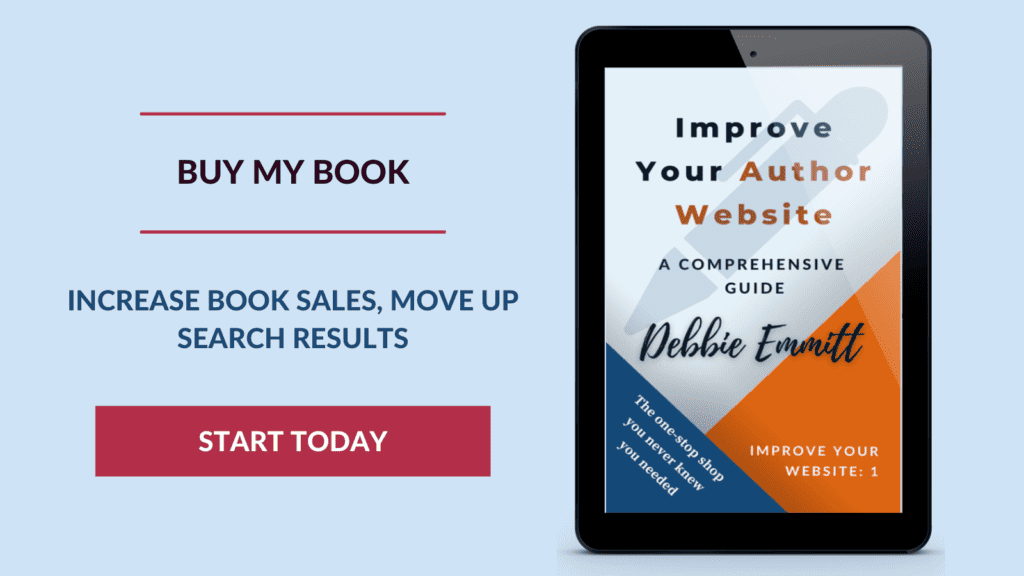
Work
The exact page title for this section will be dictated by what you include here.
- If you feel comfortable disclosing information about your work in progress, share it here. This will act as a teaser for your book, and will whet the appetite of your future readers. Include a sign-up button to your email list for people to get updates on your book’s progress.
- You may have written short stories, which you could mention here, especially if they have won an award. Short stories can work as excellent lead magnets (freebies to give away in exchange for people’s email addresses), so here would be another opportunity to increase your email list.
- A word of caution: make sure your short story lead magnet is of top quality. This is the first view that people will have of your writing. They will assume that if the short story is not enthralling and polished, then neither is your longer-form work. If your lead magnet is not of the same calibre as (the intended end result of) your work in progress, you will not convert freebie receivers into future buyers.
See how I talk about my work in progress
Contact
What are your preferred ways to be contacted? List them all on this page.
- Email – consider using a contact form, rather than displaying your email address, as this can lead to piles of spam. Forms should be short and sweet, or people will be reluctant to fill them in. Just ask for the information you need (for example, their email address, possibly name too and a free text field for their enquiry).
- Social media – if you have a Twitter, Facebook, Instagram account etc, include links on this page. Only include those where you are most active. Also include these links in your footer.
Look at how I invite people to get in touch
Don’t hit Publish without a careful check
Make sure you carefully check your webpages for grammar, spelling and punctuation errors before publishing them. It’s also important to ensure your content is optimised for search-engine listings (SEO) and free from accessibility issues, otherwise it will be hard for many people to find your site.
I cover all this and more in my comprehensive guide Improve Your Author Website. Or, if you find the whole thing a bit daunting, I offer web text editing and website proofreading services. Drop me a line if you’d like to find out more!
In summary
Don’t worry that you have nothing to put on your unpublished author website. It’s not true! Your site doesn’t have to be an epic monster, just three or four essential pages are enough for launch.
Need some inspiration? Check out Bryn Donovan’s useful article on some great author websites, including examples of unpublished author sites.
Have you got ideas of what else can go on an unpublished author’s site? Shout out in the comments below!
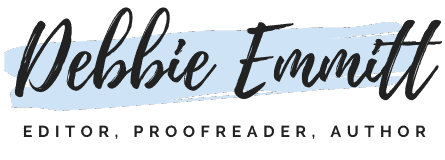
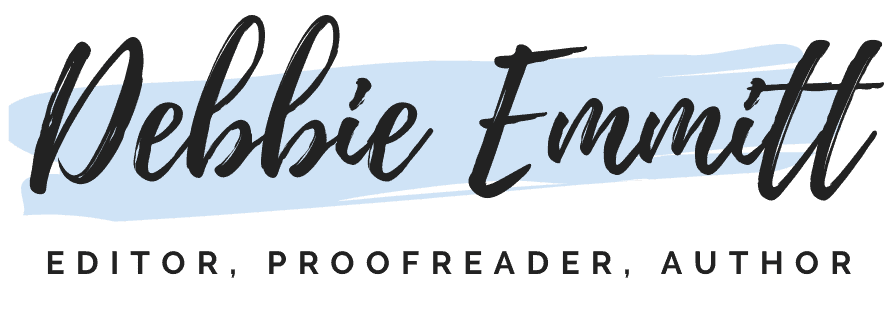
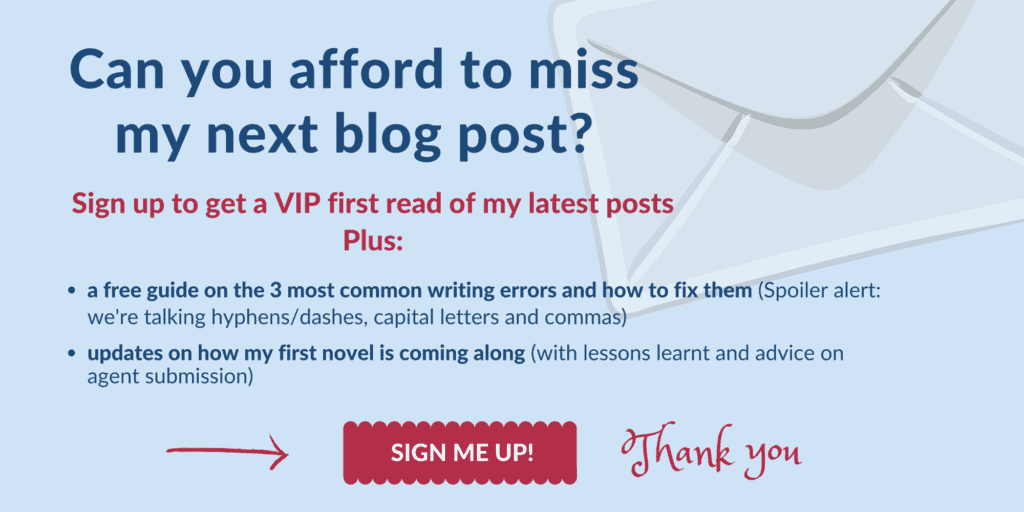
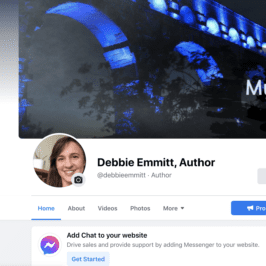


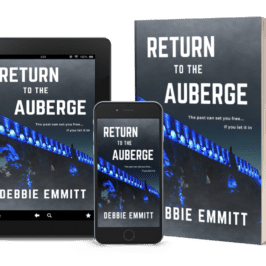


Barbara
Another useful article that will have me scurrying off to amend my website. I was wondering what you think about pop-up sign up forms. Good idea or bad? I find them a bit annoying myself but wonder if I ought to have one rather than make visitors look for my sign up form.
Debbie Emmitt
Hi Barbara, glad it was useful!
Re. pop-up sign-up forms, yes, they are annoying, but you can’t argue with the stats. I didn’t have one for a long time, but decided to trial one and at least half of my sign-ups come from it, so it works.
There are different ways of doing them, though. The ones that appear as soon as you go on a site are the most annoying in my opinion. Visitors are coming to your site to have a question answered, not to sign up to your list. Let them find the answer (or not…) to their question, then they will be more likely to sign up.
You can also have them sliding in at the bottom to be less intrusive – lots of options. I use MailChimp, which makes it easy, but I’m sure other email marketing providers offer similar features.
Susan Murray
Good day.
I have an Authors Website being developed and 2 books already published on Amazon globally and other book outlets but this goes through my publisher re: royalties.
If I write many blogs on my wordpress website will this help for recognition? in my genre?
Also many short stories on my KDP program?
Can these be introduced on my website also?
Thank you.
Regards.
Susan UK.
Debbie Emmitt
Hi Susan, thanks for your query! Writing blog posts can certainly boost your recognition as an author, as long as you are blogging about relevant topics (e.g. posts related to your genre, subject matter, or the craft of writing). Include keywords and phrases in the posts that you think your ideal audience would search on, and this will also boost your SEO (but make sure you incorporate the keywords naturally, otherwise it will be a painful reading experience!)
Regarding adding short stories to your website, that’s your call. You could give one away instead as a lead magnet to encourage signups to your mailing list (if you have one).
I hope this helps!